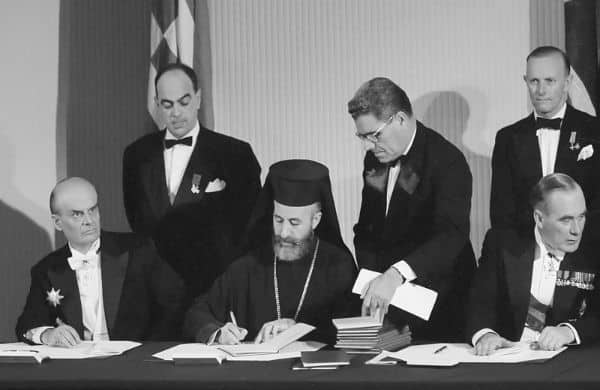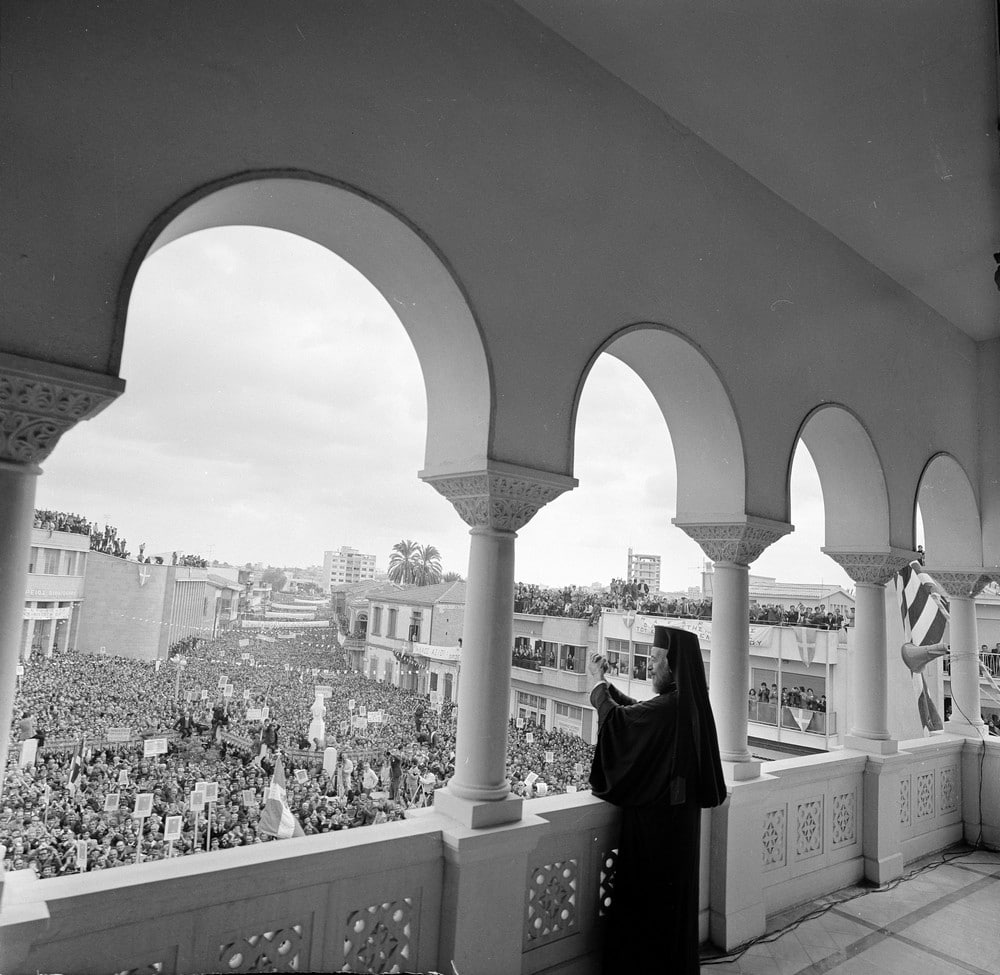In the third part of his series of articles on the Cyprus problem, Leontios Ierodiakonou looks at how Makarios’ refusal to heed the advice of the Greek government led to Britain bringing Turkey into the issue
In Greece, the first strong and stable government was that of Alexandros Papagos, which emerged in the 1952 elections. However, this government, which was very pro-Western and pro-Nato, did not want to jeopardise Greece’s relations with the traditional ally Britain.
Thus, the pressure that Makarios was exerting on the Papagos government for the internationalisation of the Cyprus problem, which would have led to a confrontation with Britain, was not yielding results.
The Archbishop however, a captive of his oaths, his absolute promises and self-commitments, continued without any thought, his unstoppable course for the immediate internationalisation of the Cyprus issue.
Thus, on August 10, 1953, he kept his word – given in a speech made a month and a half earlier in the church of Phaneromeni in Nicosia – that “we will appeal to the UN ourselves”. In his letter, he asked the UN Secretary General to include the Cypriot people’s demand for self-determination on the agenda of the 8th General Assembly of the organisation.
However, in order for the issue to be registered at the UN, it would have to be supported by a delegation of at least one member state. Therefore, in a memorandum to the Greek prime minister, he requested that Greece adopted the Cypriot application and stand by the Cypriots. Otherwise, he warned Papagos, he would “appeal to all member states” and ask for “support for the application of Cyprus”. (M. Christodoulou, The March of an Era, p80.)
The Greek delegation at the UN – a believer in the tactic of friendly settlement – did not support the registering of the matter. After the appeal of Makarios fell through, another effective lever of pressure on the government of Athens was added. The threat that the Greek Cypriot side would ask other states to put the Cyprus issue on the UN agenda became more tangible. In fact, Savvas Loizides, a well-connected Cypriot living in Greece, says that Makarios authorised him “to make efforts so that, as long as the Greek government refused to adopt the Cyprus request and forward it for inclusion on the (UN General Assembly) Agenda, I would find another member state of the UN from the Third World. I have begun to seek out states from the Asian-African Group. Some of them have shown interest”. Loizides then comments: “But the promotion of the Cyprus problem before the United Nations by a foreign country will provoke an earthquake in Greece against the Greek Government”. (S. Loizidis, Unfortunate Cyprus, p86).
Unfortunately, in this political climate, Papagos finally gave in and on August 16, 1954, just 20 days after the signing of the Suez Agreement (the worst period for the promotion of Greek interests in Cyprus), he sent a letter requesting the registering of the Cyprus issue at the UN General Assembly. It was not limited to the term “self-determination”, but also mentioned Enosis.
In the discussion that followed at the UN, it became clear that Britain was paving the way for Turkey to enter as an interested party in order to counterbalance, in this way, Greek interests. The British delegation underlined the existence of the Islamic community of the Turkish Cypriots, which was vehemently opposed to Enosis and underlined that Cyprus was ten times further away from Athens than Asia Minor. In fact, it warned that if the issue remained on the agenda of the General Assembly, the risk of inter-communal riots in Cyprus would increase. The Turkish delegation, of course, endorsed the raising of these issues and supported all the other arguments put forward by the British; even that the Cyprus issue was a purely internal matter for Britain.
In other words, from the first attempt to internationalise the Cyprus problem, it was clear that the problem was leading to a dangerous abyss. Neither complex intellectual analyses, nor highly-specialised studies, nor high-minded reflections were needed to see something very simple and obvious. At that period of time, the longer we fought against a geographically distant and temporary, time-wise, adversary, the more we opened the door and brought a, geographically, very close neighbour and potentially permanent and dangerous enemy closer. This conclusion was crystal clear.
Surely it was not possible that Makarios could not have identified the determination of Britain’s Conservative Party to involve and promote Turkey’s interests in order to counterbalance and neutralise Greek interests?
Before the UN debate, Makarios could plead (albeit unjustifiably) ignorance. But after the appeal, and especially after the debate in New York, he could not have failed to see the reality. Particularly, because he was present there and witnessed first-hand, not only the open debate but also the various behind-the-scenes goings-on.
In the end, the Greek appeal was sidelined. An important role in this development was played by Turkey in the foreground and by the American delegation behind the scenes. In the end, a resolution of American wording and inspiration was passed, postponing the discussion of the issue.
A hundred days later the armed struggle of Eoka began, of which Makarios was the political leader. Subsequently, the British invited Greece and Turkey for negotiations in London at the famous Tripartite Conference, which established the presence of Turkey as an interested party.
Subsequently, the British government, in October 1955, changed the governor of Cyprus and appointed a military man – Field Marshal Sir John Harding. On his arrival in Nicosia, apart from imposing more repressive measures, he began talks with Makarios to formulate a constitution for internal self-government.
After five months of proposals and counter-proposals, as Nicos Kranidiotis, a very close associate of Makarios at the time, wrote, the Archbishop wanted to accept the British proposals. “He was concerned, however, by the strong reaction of the circles of Kyrenia, who would accept nothing but immediate Enosis”, as well as by the negative attitude of Grivas.

After Makarios’ exile and until the signing of the Zurich London agreements, no substantial negotiations took place
The Greek government was also positive and assured Makarios of its full support. This, however, was not enough for Makarios. He wanted prime minister Constantinos Karamanlis to “state unequivocally that he accepted the proposals” before he signalled his acceptance. That is, in effect, he refused to assume his responsibility as the leader of the Greek Cypriots.
So, to buy time, he sent a letter on February 2, 1956, to Harding asking for clarifications. Harding replied on February 14, with clarifications, which Kranidiotis considered further improved the British proposals, but Makarios hesitated. In order to buy more time, on February 25, he sent another letter to Harding asking for even more clarifications.
Makarios’ inability to decide to take responsibility tended to lead him to interminable negotiations. This tactic of perpetual (open-ended, without suffocating timeframes), negotiations was bequeathed to some subsequent presidents.
On March 9, London decided to exile Makarios to the Seychelles. A year later he was released from the Seychelles but was not allowed to come to Cyprus. After his exile and until the signing of the Zurich-London agreements, no substantial negotiations took place. The British (with Turkey by their side), separated the international from the internal aspects of the Cyprus issue and gave priority to solving the external aspects, which meant talks among Britain, Greece and Turkey from which the Cypriots were excluded.
At the beginning of 1958, governor Sir Hugh Foot’s plan, which was very favourable to Turkey’s position, was presented. This was followed by prime minister Harold Macmillan’s plan (June 1958), which marked the burial of the Greek Cypriot policy on the Cyprus problem, because it provided for the administration of Cyprus by the British governor with the assistance of a representative of Greece and representative of Turkey.
Leontios Ierodiakonou, is a former Disy deputy who also served as minister of communications in the Clerides government. He is author of books on the Cyprus problem, including Fatal Leadership (1948-2021): Makarios and his Continuers

